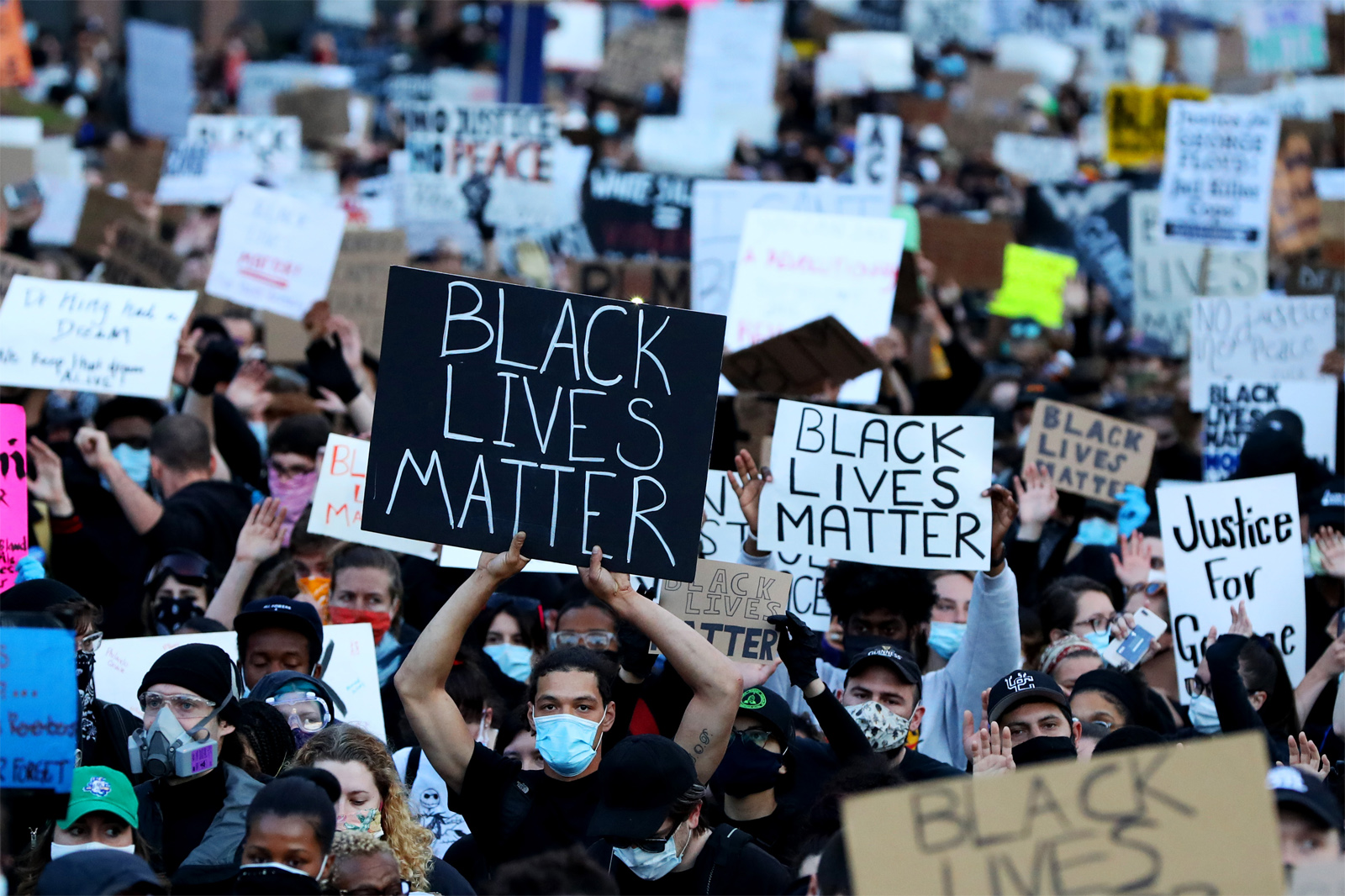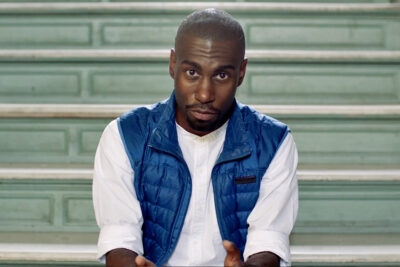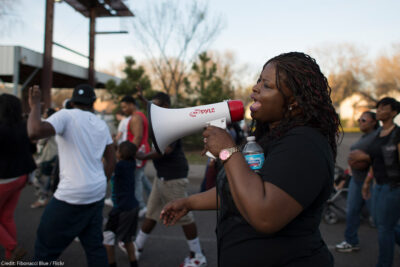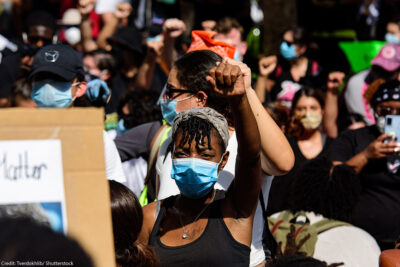
Doe v. Mckesson (Ford v. Mckesson)
What's at Stake
Can a protester be held legally responsible for injuries inflicted by a third party's violent act at the protest, when it is undisputed that the protester didn't engage in or intend violence of any kind, on the theory that he negligently organized and led the protest?
Summary
On July 9, 2016, DeRay Mckesson, a well-known activist, joined hundreds of others in Baton Rouge to protest the police killing of Alton Sterling. John Ford, then an officer with the Baton Rouge Police Department, was tasked with arresting people at the protest and was hit with a "rock-like" object thrown by a third party--not Mckesson--during an arrest.
On November 7, 2016, Ford (who filed the suit as a “John Doe” plaintiff) chose to sue Mckesson, rather than the third party who threw the hard object, on the theory that Mckesson “should have known” that the protest “would become violent as other similar riots had become violent.” He did not claim that Mckesson authorized or even knew of the rock-throwing. Indeed, to this day the rock thrower remains unidentified.
In 2017, the District Court of the Middle District of Louisiana dismissed Ford's suit as barred by the First Amendment, relying on the constitutional rule that protesters and leaders cannot be held liable for the violent acts of a third party unless they specifically intended or personally “authorized, directed, or ratified” that violence.
On appeal, the Fifth Circuit reversed the district court, holding that Mckesson could be held liable on a theory of “negligent protest-leading.” Remarkably, the Fifth Circuit reached this conclusion in three different opinions, all issued without oral argument—an initial opinion, on April 24, 2019, issued without argument; a revised opinion, on August 8, 2019, issued after Mckesson requested rehearing; and a third opinion, on December 16, 2019, including a dissent from Judge Willett, one of the panel members who had joined the previous two opinions in full.
Following the third opinion, the Fifth Circuit also voted on whether to rehear the case as a full court. Eight of the court’s sixteen judges voted to rehear the case. Because a majority is necessary, however, the case did not go en banc.
On March 5, 2020, Mckesson—represented by David Goldberg of Donahue & Goldberg, the ACLU and ACLU of Louisiana, and Billy Gibbons and Ian Atkinson of Schonekas, Evans, McGoey & McEachin—sought Supreme Court review.
On November 2, 2020, the U.S. Supreme Court vacated the Fifth Circuit’s opinion and directed it to ask the Louisiana Supreme Court to address whether a protest organizer could be held liable for injuries an officer sustains during a protest under Louisiana state law. While recognizing that “the constitutional issue” presented by the case is “undeniably important,” the Court determined that the case might be “greatly simplified” by guidance from the Louisiana Supreme Court on the meaning of Louisiana law. The state law theory, the Supreme Court explained, was “novel,” “uncertain,” and “fraught with [First Amendment] implications.”
On March 25, 2022, the Supreme Court of Louisiana issued an opinion concluding that, under the facts alleged in the complaint, the suit could proceed as a matter of state law.
On June 16, 2023, the Fifth Circuit issued its fourth opinion, again holding that Ford's theory did not violate the First Amendment but, as with each new iteration of its opinion, offering a slightly different basis: This time, the Fifth Circuit explained that Ford had successfully alleged both that 1) Mckesson had “directed his own tortious activity” of creating unreasonably safe conditions; and that 2) he had “incited” violence by “organiz[ing] and direct[ing] a protest . . . such that it was likely that a violent confrontation with the police would result.” The court held that Mckesson did not have to intend any violence whatsoever for liability to attach.
On October 5, 2023, Mckesson again filed a petition for review by the Supreme Court. The Court denied certiorari on April 15, 2024, accompanied by a statement by Justice Sotomayor. The statement notes that the Court’s denial “expresses no view about the merits of Mckesson’s claim,” and suggests that the Court’s 2023 decision in Counterman v. Colorado, which held that negligence can never be the proper standard when it comes to political speech and that intent is necessary for incitement, should govern “any future proceedings in this case.”
The district court granted Mckesson’s motion for summary judgment and summarily dismissed this lawsuit on July 10, 2024. The court found that Ford failed to offer evidence to substantiate his claim against Mckesson even under the Fifth Circuit's sweeping “negligent protest-leading” theory of liability. It also held that Ford's claim fails for another, independent reason; namely, as Justice Sotomayor suggested in the Supreme Court's 2024 consideration of this case, the Counterman decision forecloses the Fifth Circuit's “negligent protest” theory altogether on First Amendment grounds.
Once again, Ford appealed to the Fifth Circuit. On December 27, 2024, Mckesson filed a brief opposing this appeal, urging the Fifth Circuit to affirm the district court’s judgment on both grounds. As Counterman reiterated and the district court appropriately held, subjective intent is necessary to hold a person liable in the context of political speech: When it comes to protest, mere negligence in the exercise of First Amendment freedoms is never enough.
Legal Documents
-
10/28/2024
Ford Opening Brief Appealing MSJ -
12/27/2024
Appellee DeRay Mckesson's Brief
Date Filed: 10/28/2024
Court: Appeals Court (5th Cir.)
Download DocumentDate Filed: 12/27/2024
Court: Appeals Court (5th Cir.)
Download Document-
08/08/2023
Amended Complaint -
01/31/2024
Mckesson's Motion for Summary Judgment -
-
01/31/2024
Statement of Material Facts -
01/31/2024
Memorandum in Support of Motion for Summary Judgment -
01/31/2024
Deposition of John Ford (Trancsript)
Doe v. Mckesson (Ford v. Mckesson)Legal DocumentsStatement of Material FactsDate Filed: 01/31/2024
Court: District Court (M.D. La.)
Download DocumentDoe v. Mckesson (Ford v. Mckesson)Legal DocumentsMemorandum in Support of Motion for Summary JudgmentDate Filed: 01/31/2024
Court: District Court (M.D. La.)
Download DocumentDoe v. Mckesson (Ford v. Mckesson)Legal DocumentsDeposition of John Ford (Trancsript)Date Filed: 01/31/2024
Court: District Court (M.D. La.)
Download Document -
01/31/2024
-
02/23/2024
Memorandum in Opposition to Motion for Summary Judgment -
03/06/2024
Reply in Support of Motion for Summary Judgment -
04/17/2024
Mckesson's Notice Regarding the Supreme Court's Certiorari Decision -
04/18/2024
Ford's Response to Mckesson's Notice Regarding the Supreme Court's Certiorari Decision -
07/10/2024
Order Granting Mckesson's Motion for Summary Judgment & Dismissing the Lawsuit
Date Filed: 08/08/2023
Court: District Court (M.D. La.)
Download DocumentDate Filed: 01/31/2024
Court: District Court (M.D. La.)
Download DocumentDate Filed: 02/23/2024
Court: District Court (M.D. La.)
Download DocumentDate Filed: 03/06/2024
Court: District Court (M.D. La.)
Download DocumentDate Filed: 04/17/2024
Court: District Court (M.D. La.)
Download DocumentDate Filed: 04/18/2024
Court: District Court (M.D. La.)
Download DocumentDate Filed: 07/10/2024
Court: District Court (M.D. La.)
Download Document-
10/05/2023
Mckesson v Doe Petition for a Writ of Certiorari -
11/07/2023
First Amendment Scholar John D. Inazu Amicus Brief -
11/08/2023
NAACP Amicus Brief -
11/09/2023
Floyd Abrams et al. Amicus Brief -
11/09/2023
Thurgood Marshall Civil Rights Center Amicus Brief -
11/09/2023
FIRE Amicus Brief -
01/03/2024
Respondent's Brief in Opposition -
01/22/2024
Reply in Support of Certiorari -
04/15/2024
Statement of Justice Sotomayor Respecting the Denial of Certiorari
Date Filed: 10/05/2023
Court: Supreme Court (U.S.)
Download DocumentDate Filed: 11/07/2023
Court: Supreme Court (U.S.)
Download DocumentDate Filed: 11/08/2023
Court: Supreme Court (U.S.)
Download DocumentDate Filed: 11/09/2023
Court: Supreme Court (U.S.)
Download DocumentDate Filed: 11/09/2023
Court: Supreme Court (U.S.)
Download DocumentDate Filed: 11/09/2023
Court: Supreme Court (U.S.)
Download DocumentDate Filed: 01/03/2024
Court: Supreme Court (U.S.)
Download DocumentDate Filed: 01/22/2024
Court: Supreme Court (U.S.)
Download DocumentDate Filed: 04/15/2024
Court: Supreme Court (U.S.)
Download Document-
06/16/2023
Opinion
Date Filed: 06/16/2023
Court: Appeals Court (5th Cir.)
Download Document-
08/11/2021
Plaintiff-Applicant Brief on Certified Question -
09/20/2021
Defendants-Respondents Brief on Certified Question -
03/25/2022
Opinion on Certified Question
Date Filed: 08/11/2021
Court: Supreme Court (La.)
Download DocumentDate Filed: 09/20/2021
Court: Supreme Court (La.)
Download DocumentDate Filed: 03/25/2022
Court: Supreme Court (La.)
Download Document-
12/08/2022
Directive for Briefing -
12/18/2020
Appellant's Supplemental Letter Brief -
12/18/2020
Appellee's Supplemental Letter Brief -
06/25/2021
Certification Order
Date Filed: 12/08/2022
Court: Appeals Court (5th Cir.)
Download DocumentDate Filed: 12/18/2020
Court: Appeals Court (5th Cir.)
Download DocumentDate Filed: 12/18/2020
Court: Appeals Court (5th Cir.)
Download DocumentDate Filed: 06/25/2021
Court: Appeals Court (5th Cir.)
Download Document-
12/06/2019
Petition for Certiorari -
03/05/2020
New Petition for Certiorari -
05/29/2020
Respondent's Brief in Opposition -
06/22/2020
Reply Brief for Petitioner -
11/02/2020
Opinion
Date Filed: 12/06/2019
Court: Supreme Court (U.S.)
Download DocumentDate Filed: 03/05/2020
Court: Supreme Court (U.S.)
Download DocumentDate Filed: 05/29/2020
Court: Supreme Court (U.S.)
Download DocumentDate Filed: 06/22/2020
Court: Supreme Court (U.S.)
Download DocumentDate Filed: 11/02/2020
Court: Supreme Court (U.S.)
Download Document-
04/24/2019
Initial Opinion -
08/08/2019
Revised Opinion -
12/16/2019
Final Opinion -
01/28/2020
Order Denying Rehearing En Banc
Date Filed: 04/24/2019
Court: Appeals Court (5th Cir.)
Download DocumentDate Filed: 08/08/2019
Court: Appeals Court (5th Cir.)
Download DocumentDate Filed: 12/16/2019
Court: Appeals Court (5th Cir.)
Download DocumentDate Filed: 01/28/2020
Court: Appeals Court (5th Cir.)
Download Document-
11/07/2016
Complaint -
09/28/2017
Ruling and Dismissal Order
Date Filed: 11/07/2016
Court: District Court (M.D. La.)
Download DocumentDate Filed: 09/28/2017
Court: District Court (M.D. La.)
Download DocumentPress Releases
In a Major Win for our Right to Protest, Federal Court Rules in Favor of Prominent Civil Rights Activist
ACLU Statement on Supreme Court Decision to Decline to Hear Case on Protestors’ Rights
ACLU, DeRay Mckesson Urge Supreme Court to Defend First Amendment Right to Protest
SCOTUS Vacates Decision Holding Protest Organizer Liable for Injuries Caused by Unidentified Attendees in First Amendment Case
ACLU, DeRay Mckesson Urge Supreme Court to Defend First Amendment Right to Protest


